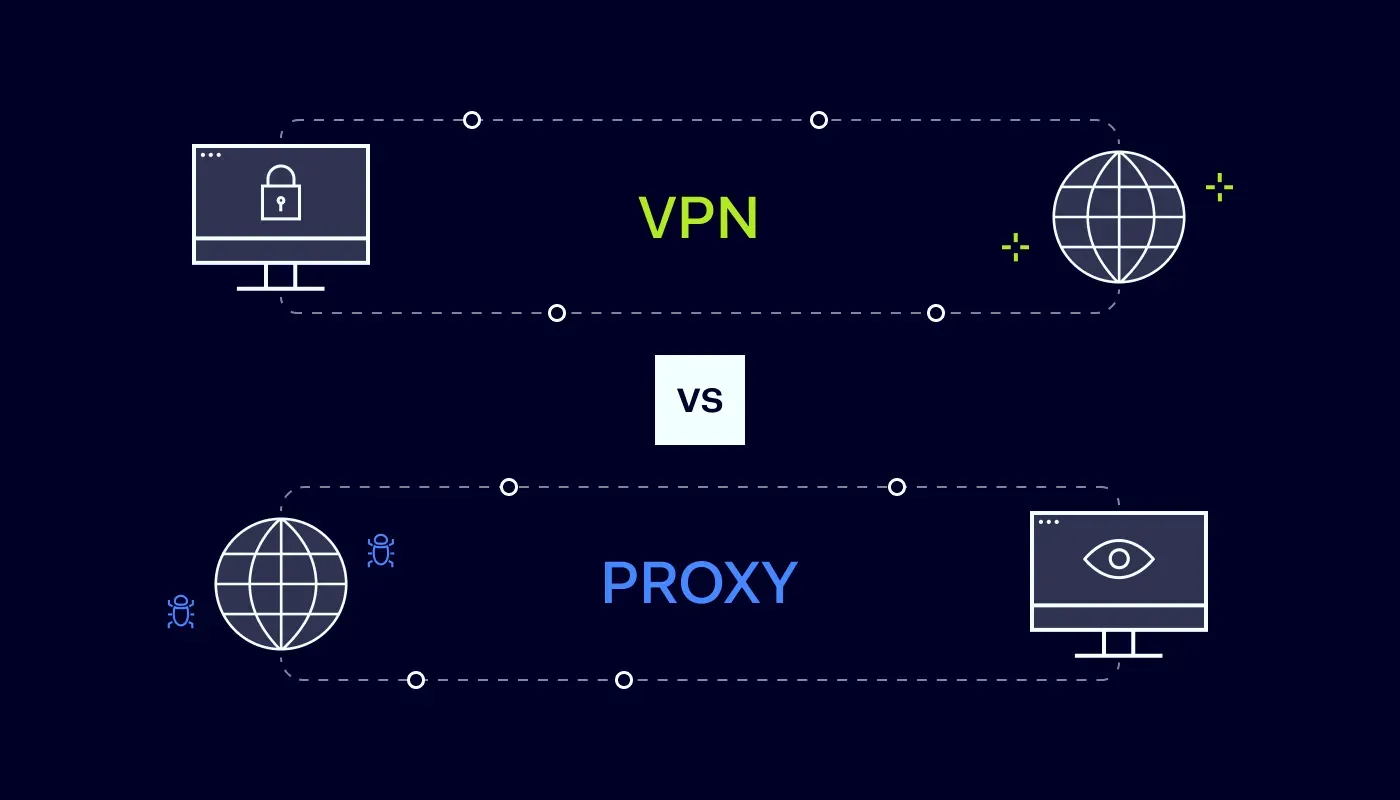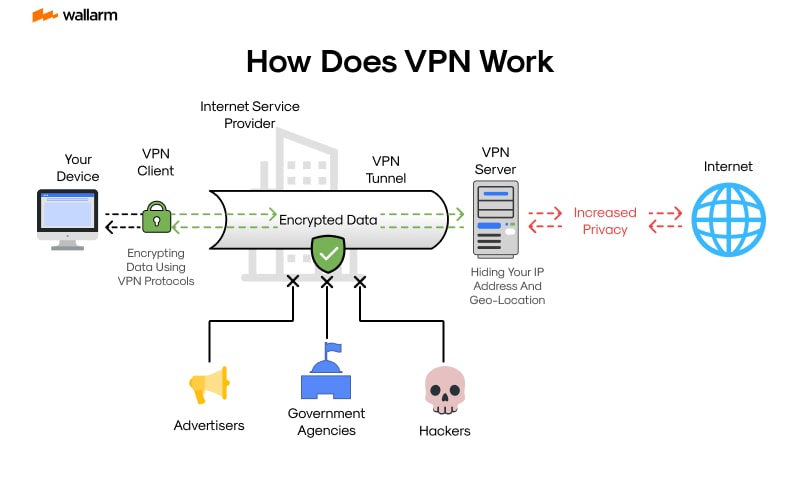In an era where digital privacy and security have become paramount, tools like proxies and VPNs (Virtual Private Networks) are often discussed as solutions for enhancing anonymity, bypassing restrictions, and securing data. While both technologies serve as intermediaries between users and the internet, their functionality, underlying technology, and use cases differ significantly. Understanding the distinctions between proxies and proxy vs VPN can help individuals and businesses choose the right tool for their specific needs.
This article delves into the fundamental differences between proxies and VPNs, their use cases, and how they act as gateways between the internet and users.
What Is a Proxy?
In discussions about proxy vs VPN, understanding the role of a proxy is crucial. A proxy server acts as an intermediary, processing user requests by forwarding them to the internet and relaying the responses back to the user. By functioning as a middleman, it masks the user’s IP address and applies rules to filter traffic or bypass content restrictions. This allows users to access blocked websites, protect their identity, and control internet usage, but without the additional layer of encryption that a VPN offers.
Key features of proxy servers:
- IP Masking: Proxies assign a new IP address to the user, hiding their actual location and identity. This is one of the main advantages often highlighted in comparisons of proxy vs VPN technologies.
- Content Filtering: Proxy servers can block or allow access to specific websites based on predefined rules, ensuring compliance with organizational or personal policies.
- Caching: By storing frequently accessed data, proxies reduce server load and speed up user access to resources, making them efficient for repetitive tasks.
- Application-Level Use: Proxies are typically configured for specific web browsers or applications, meaning they only affect traffic from those programs. This distinguishes them from VPNs, which cover all device traffic.
Types of Proxy Servers:
- When discussing proxy vs VPN, it’s essential to understand the different types of proxy servers and how they function.
- Forward Proxies: These proxies act on behalf of a user to access resources on the internet. They are often compared to VPNs in terms of their ability to bypass restrictions. However, unlike VPNs, forward proxies do not provide encryption, making them less secure when compared to the encrypted data transmission that VPNs offer.
- Reverse Proxies: Positioned on the server side, reverse proxies protect and manage traffic coming to a web server. They help ensure enhanced security and performance for websites by filtering and controlling incoming traffic.
By understanding these features and types, users can better grasp how proxies compare to VPNs in functionality and scope. While both can help with tasks like bypassing geo-restrictions, the lack of encryption in proxies differentiates them from the comprehensive security offered by VPNs in the proxy vs VPN debate.
What Is a VPN?
In the context of proxy vs VPN, a Virtual Private Network (VPN) is a comprehensive tool that provides enhanced privacy and security. A VPN encrypts and routes all user traffic through a secure tunnel to a VPN server. This server further anonymizes the user’s IP address and forwards their requests to third-party websites, effectively masking the user’s identity and ensuring data security. Unlike proxies, which primarily focus on IP masking, VPNs offer end-to-end encryption, making them a more robust solution for users seeking comprehensive online protection.
Key Features of VPNs:
- End-to-End Encryption: VPNs encrypt all internet traffic, making it unreadable to potential eavesdroppers.
- Full System Coverage: Unlike proxies, VPNs route all traffic from a device, not just specific applications.
- Geo-Restriction Bypassing: By routing traffic through servers in different countries, VPNs allow access to region-locked content.
- Enhanced Security: VPNs protect sensitive data on unsecured networks, such as public Wi-Fi.
Proxy vs VPN: Core Differences
| Feature | Proxy | VPN |
|---|---|---|
| Functionality | Routes traffic from specific apps or browsers | Routes all device traffic through a secure tunnel |
| Security | Basic IP masking | Advanced encryption and IP masking |
| Performance | Lightweight, minimal impact on speed | Slower due to encryption overhead |
| Coverage | Limited to configured apps | Covers entire device |
| Cost | Often free or inexpensive | Generally subscription-based |
While both proxies and VPNs serve as intermediaries, VPNs provide a higher level of security and privacy due to their encryption capabilities.
How VPN Servers Function as Forward Proxies
When comparing proxy vs VPN, it’s important to understand how VPN servers function similarly to forward proxies but with added security. The underlying technology of a VPN encrypts and routes client traffic to a VPN server. This server then anonymizes the user’s IP address and forwards their requests to third-party websites. In this use case, a VPN server can be thought of as a forward proxy with enhanced security, as it not only routes traffic but also encrypts it.
This dual functionality of VPNs—acting as both a proxy and an encryption tool—makes them particularly useful for applications that require both privacy and secure data transmission. Whether it’s online banking, remote work, or accessing sensitive information, VPNs offer a higher level of protection compared to traditional proxies, making them a more comprehensive solution when evaluating proxy vs VPN.
When to Choose a Proxy
In the ongoing proxy vs VPN debate, proxies are the ideal solution when speed and simplicity are key priorities. While VPNs offer comprehensive privacy and security features, proxies excel in providing fast and efficient access for specific tasks.
Key Scenarios for Choosing a Proxy:
- Bypassing Geo-Restrictions: Proxies are particularly useful for quickly accessing region-locked content. Since they can route traffic through different locations, users can access websites as if they are in a different country without the need for encryption.
- Web Scraping: Businesses often use proxies for web scraping because they can distribute requests across multiple proxy servers, reducing the risk of being blocked and enabling efficient data gathering.
- Content Filtering: Proxies allow organizations to enforce internet usage policies by restricting access to specific websites. This makes them suitable for environments where controlling internet activity is necessary.
- Lightweight Tasks: For activities that don’t require advanced encryption, such as basic browsing, proxies provide a simpler and faster solution compared to VPNs.
In situations where security is not the primary concern, and speed or simplicity is more important, a proxy is often the best choice in the proxy vs VPN comparison.
When to Choose a VPN
In the debate of proxy vs VPN, VPNs emerge as the preferred choice for situations requiring robust security and privacy measures. Unlike proxies, VPNs encrypt all internet traffic, providing a secure and private browsing experience.
Key Scenarios for Choosing a VPN:
- Secure Communication: VPNs are indispensable for transmitting sensitive data over public or unsecured networks. Their encryption ensures that communications remain private and protected from interception.
- Comprehensive Privacy: Offering system-wide protection, VPNs safeguard users from tracking and surveillance across all applications, not just specific browsers or programs. This makes them a superior choice when comparing proxy vs VPN for privacy concerns.
- Remote Work: VPNs enable employees to access corporate resources securely, ensuring data integrity and privacy, even when working from remote or public locations.
- Streaming and Gaming: By routing traffic through servers in various regions, VPNs allow users to bypass geo-restrictions while maintaining stable connections for streaming or gaming, a feature that outperforms proxies in these scenarios.
When security, privacy, and unrestricted access are priorities, VPNs provide a comprehensive solution that often surpasses the capabilities of a proxy server.
Conclusion
Both proxies and VPNs serve as essential tools for enhancing privacy and security in the digital world. While proxies are ideal for tasks requiring lightweight and straightforward solutions, VPNs offer robust security and system-wide coverage.
The choice between the two depends on the user’s specific needs. If you are looking to mask your IP address for basic browsing or bypass minor restrictions, a proxy may suffice. However, for secure communication, comprehensive privacy, and encryption, a VPN is the superior choice.
Understanding the differences between proxy vs VPN helps users make informed decisions about protecting their online activities. Both technologies act as gateways between the internet and users, but VPNs go a step further by securing all traffic and anonymizing data comprehensively. Whether you choose a proxy or a VPN, investing in these tools is a step toward a safer and more private digital experience.



